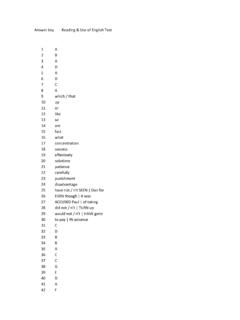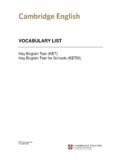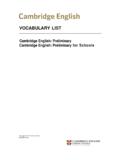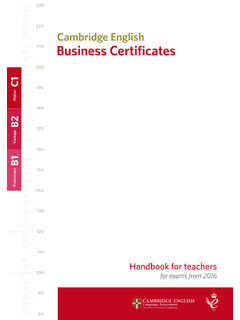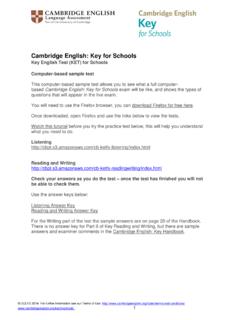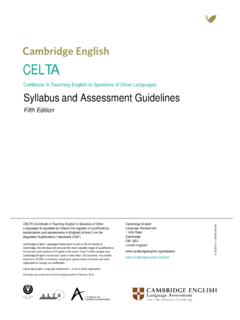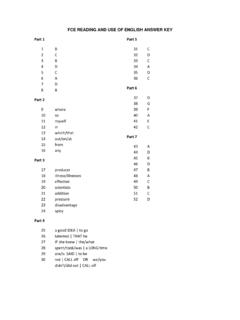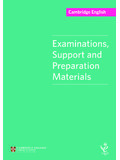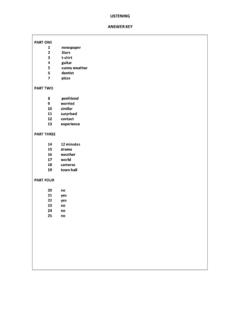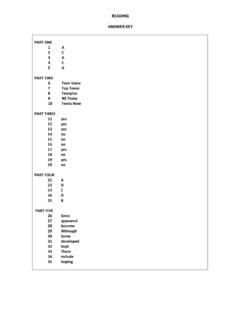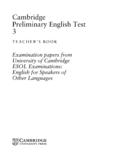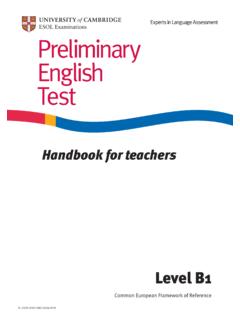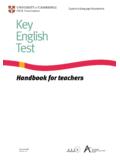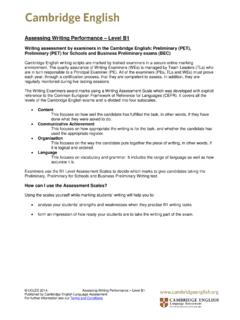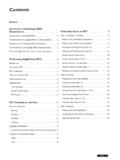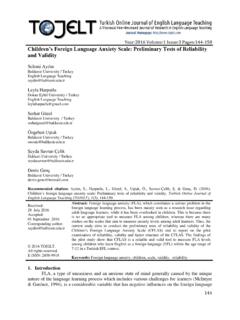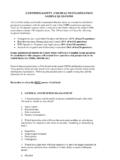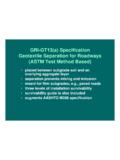Transcription of 230 CEFR - cambridgeenglish.org
1 Handbook for teachersfor exams from 2016 Cambridge EnglishAdvancedC190801001101201301401501 60170180190200210220230C2B1B2A2A1 BelowA1 Independent userProficient userBasic userCEFRExam content and overviewPaper/timingTest contentTest focusREADING AND USE OF ENGLISH1 hr 30 minsPart 1A modified cloze test containing eight gaps followed by eight multiple-choice are expected to be able to: demonstrate the ability to apply their knowledge and control of the language system by completing a number of tasks at text and sentence level; demonstrate a variety of reading skills including understanding of specific information, text organisation features, implication, tone and text 2A modified cloze test containing eight 3A text containing eight gaps. Each gap corresponds to a word. The stems of the missing words are given beside the text and must be changed to form the missing 4 Six separate questions, each with a lead-in sentence and a gapped second sentence to be completed in three to six words, one of which is a given key 5A text followed by six 4-option multiple-choice 6 Four short texts, followed by four cross-text multiple-matching 7A text from which six paragraphs have been removed and placed in jumbled order, together with an additional paragraph, after the 8A text or several short texts, preceded by 10 multiple-matching hr 30 minsPart 1 One compulsory are expected to write an essay in response to a proposition to discuss, and accompanying 2 Candidates choose one task from a choice of three are expected to be able to write non-specialised text types such as a letter, a report.
2 A review or a 40 minsPart 1 Three short extracts or exchanges between interacting speakers. There are two multiple-choice questions for each are expected to be able to show understanding of feeling, attitude, detail, opinion, purpose, agreement and 2A monologue with a sentence-completion task which has eight items. Part 3A text involving interacting speakers, with six multiple-choice 4 Five short, themed monologues, with 10 multiple-matching mins (for pairs)Part 1A short conversation between the interlocutor and each candidate (spoken questions).Candidates are expected to be able to respond to questions and to interact in conversational 2An individual long turn for each candidate, followed by a response from the second candidate (visual and written stimuli, with spoken instructions).Part 3A two-way conversation between the candidates (written stimuli, with spoken instructions).Part 4A discussion on topics related to Part 3 (spoken questions).
3 1 CAMBRIDGE english : ADVANCED HANDBOOK FOR TEACHERSCONTENTSC ontentsPrefaceThis handbook is for teachers who are preparing candidates for Cambridge english : Advanced, also known as Certificate in Advanced english (CAE). The introduction gives an overview of the exam and its place within Cambridge english Language Assessment. This is followed by a focus on each paper and includes content, advice on preparation and example you need further copies of this handbook, please email Cambridge english Language Assessment 2 The world s most valuable range of english qualifications 2 Key features of Cambridge english exams 2 Proven quality 3 Cambridge english : Advanced an overview 3 Exam formats 3 Who is the exam for?
4 3 Who recognises the exam? 3 What level is the exam? 3 About the exam 4A thorough test of all areas of language ability 4 Marks and results 5 Exam support 6 Support for teachers 6 Support for candidates 6 Reading and Use of english 7 General description 7 Structure and tasks
5 7 The eight parts of the Reading and Use of english paper 8 Preparation 9 Sample paper 1 12 Answer key to sample paper 1 19 Sample paper 2 20 Answer key to sample paper 2 27 Candidate answer sheet 27 Writing 29 General description 29 Structure and tasks 29 The two parts of the Writing paper 30 Preparation 30 Sample paper 1 33 Assessment of Writing 34 Sample scripts with examiner comments 38 Sample paper 2 44 Sample scripts with examiner comments 45 Writing answer sheet 51 Listening
6 54 General description 54 Structure and tasks 54 The four parts of the Listening paper 55 Preparation 55 Sample paper 1 58 Answer key to sample paper 1 65 Sample paper 2 66 Answer key to sample paper 2 73 Candidate answer sheet 74 Speaking 75 General description 75 Structure and tasks 75 The four parts of the Speaking test 76 Preparation 77 Sample test 1 79 Sample test 2 82 Assessment of Speaking 85 Cambridge english .
7 Advanced glossary 902 CAMBRIDGE english : ADVANCED HANDBOOK FOR TEACHERSABOUT CAMBRIDGE english LANGUAGE ASSESSMENTA bout Cambridge english Language AssessmentCambridge english : Advanced is developed by Cambridge english Language Assessment, part of the University of are one of three major exam boards which form the Cambridge Assessment Group (Cambridge Assessment). More than 8 million Cambridge Assessment exams are taken in over 170 countries around the world every International ExaminationsPrepares school students for life, helping them develop an informed curiosity and a lasting passion for learningCambridge Assessment: the trading name for the University of Cambridge Local Examinations Syndicate (UCLES)Cambridge english Language Assessment Provider of the world s most valuable range of qualifications for learners and teachers of english OCR: Oxford Cambridge and RSA ExaminationsOne of the UK s leading providers of qualificationsDepartments of the UniversityDepartments (exam boards)One of the oldest universities in the world and one of the largest in the United KingdomOxford Cambridge and RSAThe world s most valuable range of english qualificationsCambridge english Language Assessment offers the world s leading range of qualifications for learners and teachers of english .
8 Over 5 million Cambridge english exams are taken each year in more than 130 countries. We offer assessments across the full spectrum of language ability for general communication, for professional and academic purposes, and also for specific business english qualifications. All of our exams are aligned to the principles and approach of the Common European Framework of Reference for Languages (CEFR).To find out more about Cambridge english exams and the CEFR, go to EnglishA range of exams to meet di erent needsC1C2B2B1A2A1C1C2B2B1A2A1 Proficient userIndependent userCommon European Framework of Reference (CEFR)Basic (KET) for Schools Starters(YLE Starters)Movers (YLE Movers)Flyers(YLE Flyers)Preliminary(PET) for SchoolsFirst (FCE) for SchoolsKey(KET)Preliminary(PET)First(FCE )Advanced(CAE)BusinessVantage(BEC)Busine ssPreliminary(BEC)BusinessHigher(BEC)BUL ATSIELTSP roficiency(CPE)9 Key features of Cambridge english examsCambridge english exams.
9 Are based on realistic tasks and situations so that preparing for their exam gives learners real-life language skills accurately and consistently test all four language skills reading, writing, listening and speaking encourage positive learning experiences, and seek to achieve a positive impact on teaching wherever possible are as fair as possible to all candidates, whatever their national, ethnic and linguistic background, gender or english : ADVANCED HANDBOOK FOR TEACHERSCAMBRIDGE english : ADVANCED AN OVERVIEWP roven qualityOur commitment to providing exams of the highest possible quality is underpinned by an extensive programme of research and evaluation. Question papers are produced and pretested using rigorous procedures to ensure accuracy and fairness, and the marking and grading of our exams is continuously monitored for consistency. More details can be found in our publication Principles of Good Practice, which can be downloaded free from english : Advanced an overviewCambridge english : Advanced was originally introduced in 1991 and is a high-level qualification that is officially recognised by universities, employers and governments around the world.
10 It proves that a candidate has a high level of english for use in academic or professional formatsCambridge english : Advanced can be taken as either a paper-based or a computer-based is the exam for?Cambridge english : Advanced is typically taken by high achievers who want to show they can: follow an academic course at university level communicate effectively at managerial and professional level participate with confidence in workplace meetings or academic tutorials and seminars carry out complex and challenging research stand out and differentiate recognises the exam? Cambridge english : Advanced is accepted by more than 6,000 organisations, employers and governments around the world as being a reliable, accurate and fair test of english . This includes universities and colleges in the UK, USA, Canada, Australia, Europe and beyond. The Australian government s Department of Immigration and Border Protection (DIBP) has approved Cambridge english : Advanced for a range of visa categories.
